2023-2024学年英语鲁教版(五四学制)九年级全一册Unit 4I like music that I can dance to 单元复习课件(共19张PPT)
文档属性
| 名称 | 2023-2024学年英语鲁教版(五四学制)九年级全一册Unit 4I like music that I can dance to 单元复习课件(共19张PPT) |
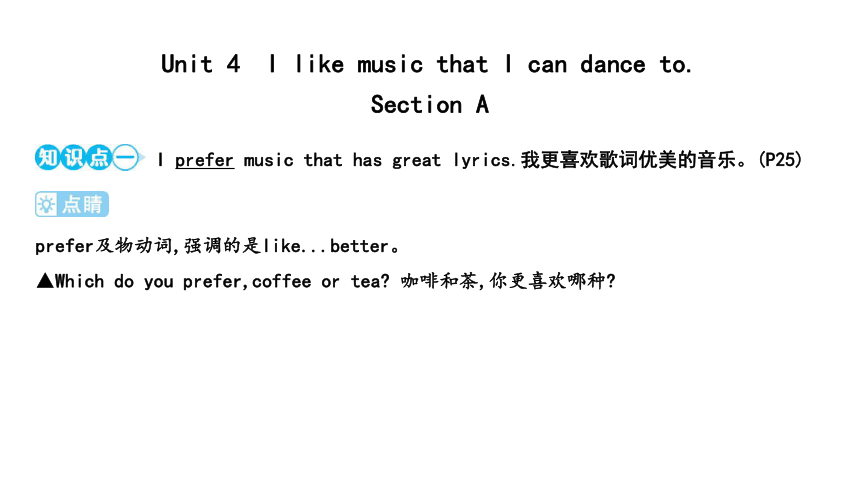
|
|
| 格式 | pptx | ||
| 文件大小 | 287.8KB | ||
| 资源类型 | 教案 | ||
| 版本资源 | 鲁教版 | ||
| 科目 | 英语 | ||
| 更新时间 | 2024-07-08 00:00:00 | ||
图片预览

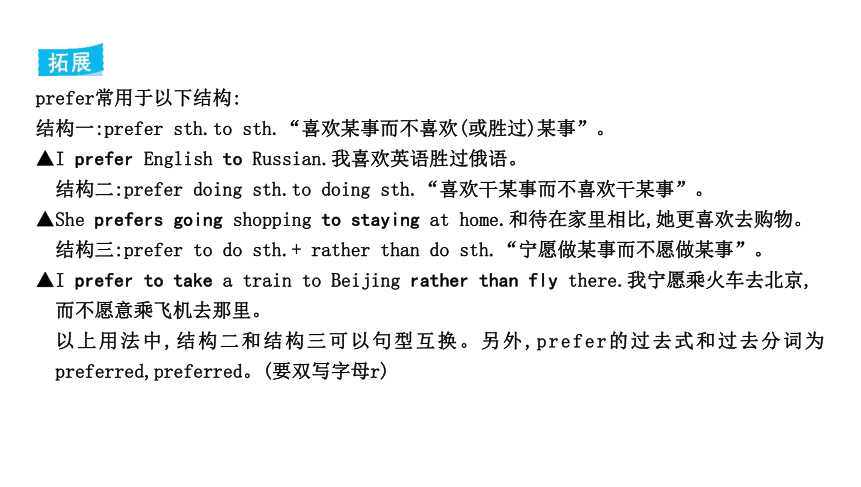
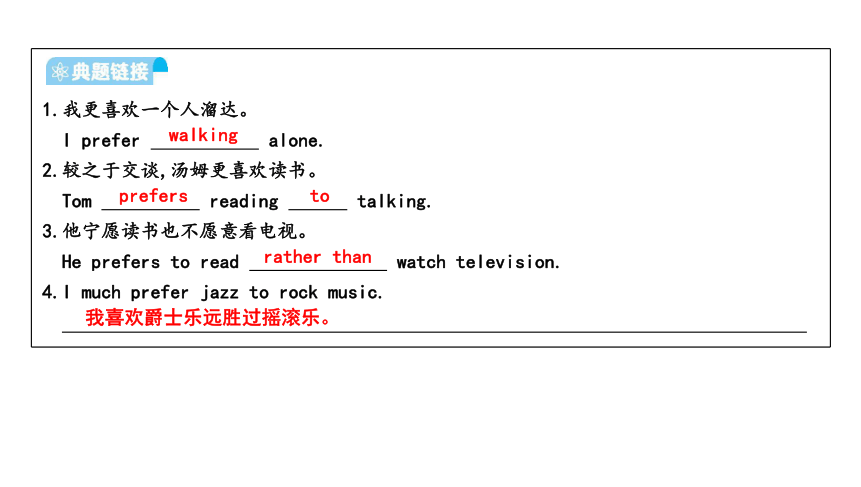
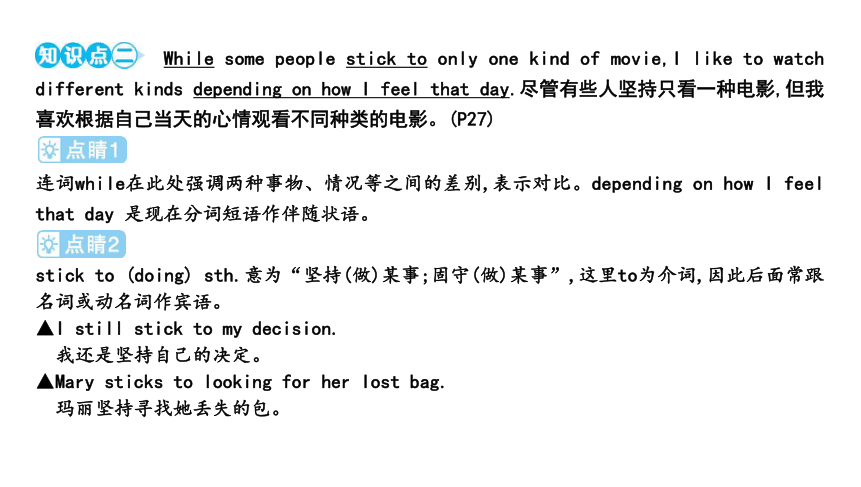
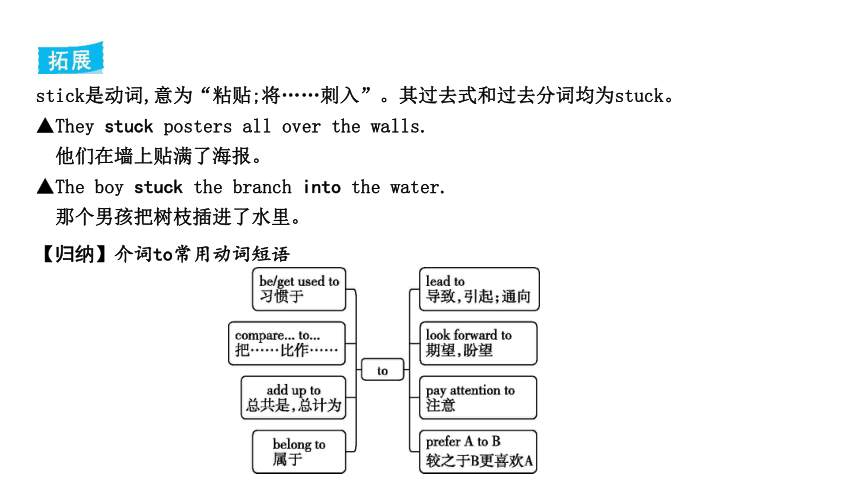
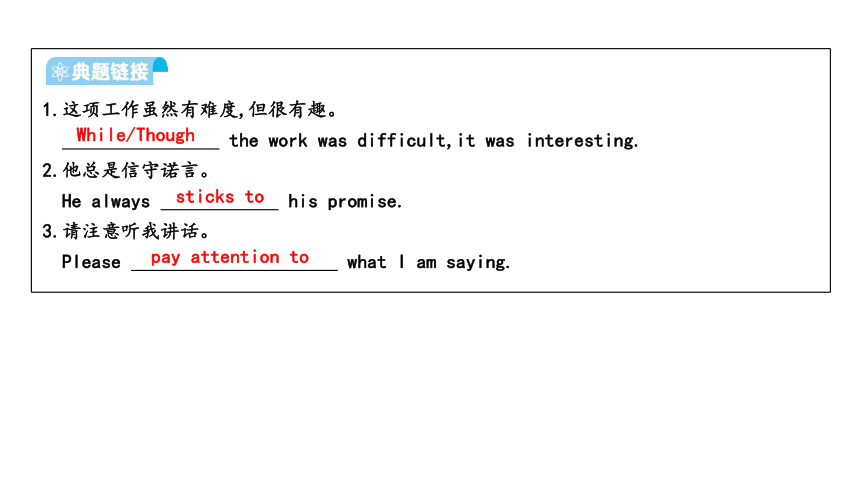
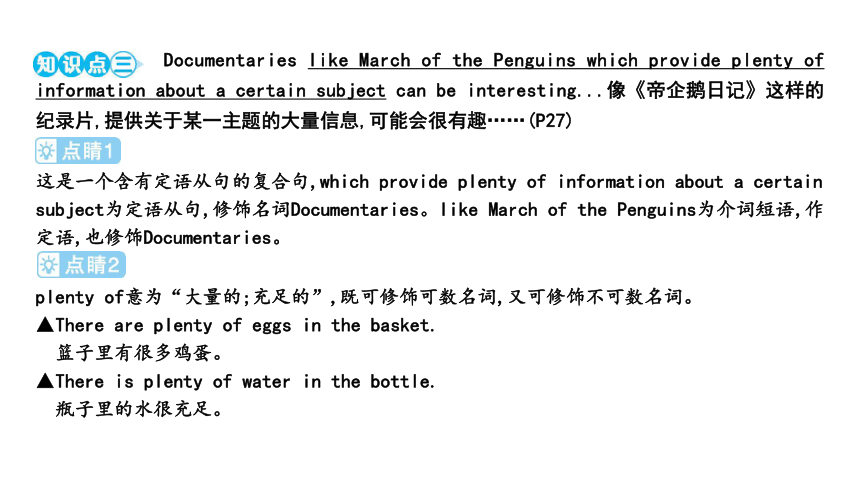
文档简介
(共19张PPT)
Unit 4 I like music that I can dance to.
Section A
I prefer music that has great lyrics.我更喜欢歌词优美的音乐。(P25)
prefer及物动词,强调的是like...better。
▲Which do you prefer,coffee or tea 咖啡和茶,你更喜欢哪种
prefer常用于以下结构:
结构一:prefer sth.to sth.“喜欢某事而不喜欢(或胜过)某事”。
▲I prefer English to Russian.我喜欢英语胜过俄语。
结构二:prefer doing sth.to doing sth.“喜欢干某事而不喜欢干某事”。
▲She prefers going shopping to staying at home.和待在家里相比,她更喜欢去购物。
结构三:prefer to do sth.+ rather than do sth.“宁愿做某事而不愿做某事”。
▲I prefer to take a train to Beijing rather than fly there.我宁愿乘火车去北京,
而不愿意乘飞机去那里。
以上用法中,结构二和结构三可以句型互换。另外,prefer的过去式和过去分词为
preferred,preferred。(要双写字母r)
1.我更喜欢一个人溜达。
I prefer alone.
2.较之于交谈,汤姆更喜欢读书。
Tom reading talking.
3.他宁愿读书也不愿意看电视。
He prefers to read watch television.
4.I much prefer jazz to rock music.
walking
prefers
to
rather than
我喜欢爵士乐远胜过摇滚乐。
While some people stick to only one kind of movie,I like to watch different kinds depending on how I feel that day.尽管有些人坚持只看一种电影,但我喜欢根据自己当天的心情观看不同种类的电影。(P27)
连词while在此处强调两种事物、情况等之间的差别,表示对比。depending on how I feel that day 是现在分词短语作伴随状语。
stick to (doing) sth.意为“坚持(做)某事;固守(做)某事”,这里to为介词,因此后面常跟名词或动名词作宾语。
▲I still stick to my decision.
我还是坚持自己的决定。
▲Mary sticks to looking for her lost bag.
玛丽坚持寻找她丢失的包。
stick是动词,意为“粘贴;将……刺入”。其过去式和过去分词均为stuck。
▲They stuck posters all over the walls.
他们在墙上贴满了海报。
▲The boy stuck the branch into the water.
那个男孩把树枝插进了水里。
【归纳】介词to常用动词短语
1.这项工作虽然有难度,但很有趣。
the work was difficult,it was interesting.
2.他总是信守诺言。
He always his promise.
3.请注意听我讲话。
Please what I am saying.
While/Though
sticks to
pay attention to
Documentaries like March of the Penguins which provide plenty of information about a certain subject can be interesting...像《帝企鹅日记》这样的纪录片,提供关于某一主题的大量信息,可能会很有趣……(P27)
这是一个含有定语从句的复合句,which provide plenty of information about a certain subject为定语从句,修饰名词Documentaries。like March of the Penguins为介词短语,作定语,也修饰Documentaries。
plenty of意为“大量的;充足的”,既可修饰可数名词,又可修饰不可数名词。
▲There are plenty of eggs in the basket.
篮子里有很多鸡蛋。
▲There is plenty of water in the bottle.
瓶子里的水很充足。
【注意】plenty of通常用于肯定句中,在否定句、疑问句中多用much,many或enough。
1.医生要他多喝水。
The doctor told him to drink water.
( )2.Chaka Salt Lake is known as Mirror of the Sky interests more and more tourists.
A.where B.which C.who
plenty of/lots of
B
I can just shut off my brain,sit back and enjoy watching an exciting superhero who always saves the world just in time.我可以不用动脑思考,只是舒服地坐着,高兴地观看一位总是及时拯救世界的令人激动的超级英雄。(P27)
这是一个含有定语从句的复合句。who always saves the world just in time为定语从句,修饰名词superhero。
shut off意为“关闭;停止运转”。
▲Don’t forget to shut off the gas.
别忘了关上煤气。
▲I wish someone would shut off the car alarm.
我希望有人会把汽车的报警器关上。
【注意】shut off为“动词+副词”构成的词组,代词作宾语时,要放在中间。
sit back意为“坐回;舒服地坐好”。
▲Sit back and relax.I will open a bottle of beer.
坐下来放松一下。我来开瓶啤酒。
▲He sat back in his chair and started to read.
他在椅子上舒服地坐下来,开始读书。
( )1.—The government is trying to protect the environment now.
—Yeah.It is reported that some factories will be soon.
A.set up B.shut off
C.given up D.turned off
( )2.Yuan Longping is a great scientist was honored as“The Father of Hybrid Rice”.
A.when B.who
C.which D.whose
3.你需要做的只是坐下来进行放松。
All you need to do is to and relax.
B
B
sit back
Section B
The music was strangely beautiful,but under the beauty I sensed a strong sadness and pain.乐曲异常优美,但在这美的背后我感觉到了一种强烈的悲伤和痛苦。(P30)
sense作动词,意为“感觉到;意识到”,其后可直接跟宾语。
▲They sensed danger,and then they started to run.
他们感觉到有危险,然后撒腿就跑。
sense还可作名词,意为“感觉;意识;意义,含义”。
▲Prost had sensed that dogs have a strong sense of smell.
普罗斯特已经觉察到狗的嗅觉很灵敏。
【图解】
▲Everyone can sense the five senses.
每个人都能感受到这五种感觉。
sadness为名词,意为“悲伤;悲痛”。
▲There was a terrible sadness in her eyes.
她眼神中流露出深深的悲伤。
sad adj.悲伤的;难过的 sadly adv.悲伤地;难过地
▲The girl cried sadly after listening to the sad story.
听完这个令人悲伤的故事,那个女孩悲伤地哭了。
1.The word“love”is used in different (sense) by different people.
2.Levin sat there,with an expression of (sad) on his face.
3.“Maybe I can’t reach the ocean,” she said (sad) to herself.
senses
sadness
sadly
reflect为动词,意为“反映;映出”。
▲The sun is reflected large and red in the water.
太阳映在水中,又大又红。
▲The mirror reflects my face.
镜子映出我的脸。
The piece had a simple name,Erquan Yingyue (Moon Reflected on Second Spring),but it was one of the most moving pieces of music that I’ve ever heard.这首曲子有一个简单的名字——《二泉映月》,但它是我曾听过的最感人的曲子之一。(P30)
reflection n.映照出的影像;反映
▲He admired his reflection in the mirror.
他欣赏着自己在镜中的影像。
moving是形容词,意为“动人的;令人感动的”,常用于修饰“物”。
▲I saw a moving movie last night.
我昨天晚上看了一部动人的电影。
【注意】moved 作形容词,意为“感动的”,常作表语,修饰人。
▲The students are moved by the moving movie.
学生们被这部令人感动的电影感动了。
【图解】
▲He was moved by his reflection that was reflected in the mirror.
他被镜子中映出的他的影像感动了。
1.Your clothes are often a (reflect) of your personality.
2.She could see herself (reflect) in his eyes.
3.Many people went to help him,which was a (move) scene.
4.When he won the championship,he was (move) to tears.
reflection
reflected
moving
moved
Unit 4 I like music that I can dance to.
Section A
I prefer music that has great lyrics.我更喜欢歌词优美的音乐。(P25)
prefer及物动词,强调的是like...better。
▲Which do you prefer,coffee or tea 咖啡和茶,你更喜欢哪种
prefer常用于以下结构:
结构一:prefer sth.to sth.“喜欢某事而不喜欢(或胜过)某事”。
▲I prefer English to Russian.我喜欢英语胜过俄语。
结构二:prefer doing sth.to doing sth.“喜欢干某事而不喜欢干某事”。
▲She prefers going shopping to staying at home.和待在家里相比,她更喜欢去购物。
结构三:prefer to do sth.+ rather than do sth.“宁愿做某事而不愿做某事”。
▲I prefer to take a train to Beijing rather than fly there.我宁愿乘火车去北京,
而不愿意乘飞机去那里。
以上用法中,结构二和结构三可以句型互换。另外,prefer的过去式和过去分词为
preferred,preferred。(要双写字母r)
1.我更喜欢一个人溜达。
I prefer alone.
2.较之于交谈,汤姆更喜欢读书。
Tom reading talking.
3.他宁愿读书也不愿意看电视。
He prefers to read watch television.
4.I much prefer jazz to rock music.
walking
prefers
to
rather than
我喜欢爵士乐远胜过摇滚乐。
While some people stick to only one kind of movie,I like to watch different kinds depending on how I feel that day.尽管有些人坚持只看一种电影,但我喜欢根据自己当天的心情观看不同种类的电影。(P27)
连词while在此处强调两种事物、情况等之间的差别,表示对比。depending on how I feel that day 是现在分词短语作伴随状语。
stick to (doing) sth.意为“坚持(做)某事;固守(做)某事”,这里to为介词,因此后面常跟名词或动名词作宾语。
▲I still stick to my decision.
我还是坚持自己的决定。
▲Mary sticks to looking for her lost bag.
玛丽坚持寻找她丢失的包。
stick是动词,意为“粘贴;将……刺入”。其过去式和过去分词均为stuck。
▲They stuck posters all over the walls.
他们在墙上贴满了海报。
▲The boy stuck the branch into the water.
那个男孩把树枝插进了水里。
【归纳】介词to常用动词短语
1.这项工作虽然有难度,但很有趣。
the work was difficult,it was interesting.
2.他总是信守诺言。
He always his promise.
3.请注意听我讲话。
Please what I am saying.
While/Though
sticks to
pay attention to
Documentaries like March of the Penguins which provide plenty of information about a certain subject can be interesting...像《帝企鹅日记》这样的纪录片,提供关于某一主题的大量信息,可能会很有趣……(P27)
这是一个含有定语从句的复合句,which provide plenty of information about a certain subject为定语从句,修饰名词Documentaries。like March of the Penguins为介词短语,作定语,也修饰Documentaries。
plenty of意为“大量的;充足的”,既可修饰可数名词,又可修饰不可数名词。
▲There are plenty of eggs in the basket.
篮子里有很多鸡蛋。
▲There is plenty of water in the bottle.
瓶子里的水很充足。
【注意】plenty of通常用于肯定句中,在否定句、疑问句中多用much,many或enough。
1.医生要他多喝水。
The doctor told him to drink water.
( )2.Chaka Salt Lake is known as Mirror of the Sky interests more and more tourists.
A.where B.which C.who
plenty of/lots of
B
I can just shut off my brain,sit back and enjoy watching an exciting superhero who always saves the world just in time.我可以不用动脑思考,只是舒服地坐着,高兴地观看一位总是及时拯救世界的令人激动的超级英雄。(P27)
这是一个含有定语从句的复合句。who always saves the world just in time为定语从句,修饰名词superhero。
shut off意为“关闭;停止运转”。
▲Don’t forget to shut off the gas.
别忘了关上煤气。
▲I wish someone would shut off the car alarm.
我希望有人会把汽车的报警器关上。
【注意】shut off为“动词+副词”构成的词组,代词作宾语时,要放在中间。
sit back意为“坐回;舒服地坐好”。
▲Sit back and relax.I will open a bottle of beer.
坐下来放松一下。我来开瓶啤酒。
▲He sat back in his chair and started to read.
他在椅子上舒服地坐下来,开始读书。
( )1.—The government is trying to protect the environment now.
—Yeah.It is reported that some factories will be soon.
A.set up B.shut off
C.given up D.turned off
( )2.Yuan Longping is a great scientist was honored as“The Father of Hybrid Rice”.
A.when B.who
C.which D.whose
3.你需要做的只是坐下来进行放松。
All you need to do is to and relax.
B
B
sit back
Section B
The music was strangely beautiful,but under the beauty I sensed a strong sadness and pain.乐曲异常优美,但在这美的背后我感觉到了一种强烈的悲伤和痛苦。(P30)
sense作动词,意为“感觉到;意识到”,其后可直接跟宾语。
▲They sensed danger,and then they started to run.
他们感觉到有危险,然后撒腿就跑。
sense还可作名词,意为“感觉;意识;意义,含义”。
▲Prost had sensed that dogs have a strong sense of smell.
普罗斯特已经觉察到狗的嗅觉很灵敏。
【图解】
▲Everyone can sense the five senses.
每个人都能感受到这五种感觉。
sadness为名词,意为“悲伤;悲痛”。
▲There was a terrible sadness in her eyes.
她眼神中流露出深深的悲伤。
sad adj.悲伤的;难过的 sadly adv.悲伤地;难过地
▲The girl cried sadly after listening to the sad story.
听完这个令人悲伤的故事,那个女孩悲伤地哭了。
1.The word“love”is used in different (sense) by different people.
2.Levin sat there,with an expression of (sad) on his face.
3.“Maybe I can’t reach the ocean,” she said (sad) to herself.
senses
sadness
sadly
reflect为动词,意为“反映;映出”。
▲The sun is reflected large and red in the water.
太阳映在水中,又大又红。
▲The mirror reflects my face.
镜子映出我的脸。
The piece had a simple name,Erquan Yingyue (Moon Reflected on Second Spring),but it was one of the most moving pieces of music that I’ve ever heard.这首曲子有一个简单的名字——《二泉映月》,但它是我曾听过的最感人的曲子之一。(P30)
reflection n.映照出的影像;反映
▲He admired his reflection in the mirror.
他欣赏着自己在镜中的影像。
moving是形容词,意为“动人的;令人感动的”,常用于修饰“物”。
▲I saw a moving movie last night.
我昨天晚上看了一部动人的电影。
【注意】moved 作形容词,意为“感动的”,常作表语,修饰人。
▲The students are moved by the moving movie.
学生们被这部令人感动的电影感动了。
【图解】
▲He was moved by his reflection that was reflected in the mirror.
他被镜子中映出的他的影像感动了。
1.Your clothes are often a (reflect) of your personality.
2.She could see herself (reflect) in his eyes.
3.Many people went to help him,which was a (move) scene.
4.When he won the championship,he was (move) to tears.
reflection
reflected
moving
moved
同课章节目录
- Unit 1 When was it invented?
- Section A
- Section B
- Unit 2 Teenagers should be allowed to choose their
- Section A
- Section B
- Unit 3 It must belong to Carla.
- Section A
- Section B
- Unit 4 I like music that I can dance to.
- Section A
- Section B
- Unit 5 You’re supposed to shake hands.
- Section A
- Section B
- Unit 6 Sad movies make me cry.
- Section A
- Section B
- Unit 7 Life is full of the unexpected.
- Section A
- Section B
- Unit 8 We're trying to save the earth!
- Section A
- Section B
- Unit 9 It's important to have good habits.
- Section A
- Section B
- Unit 10 I remember meeting all of you in Grade 6.
- Section A
- Section B
